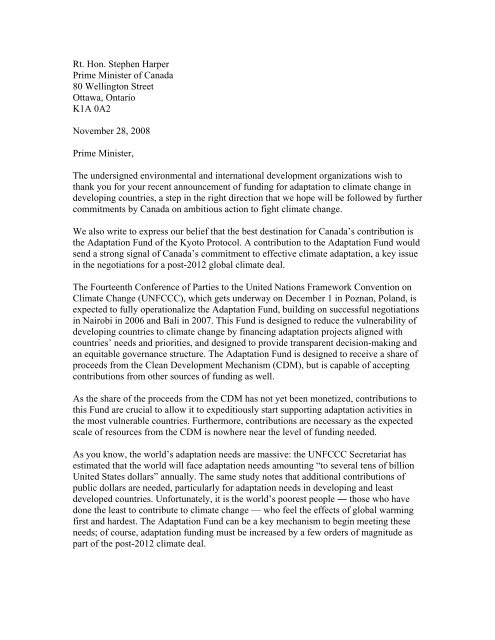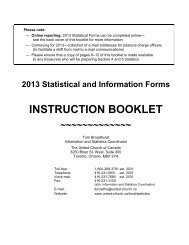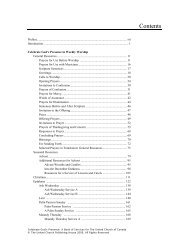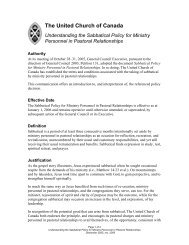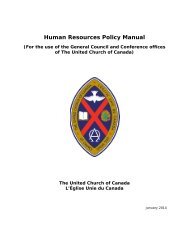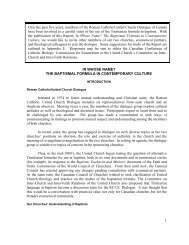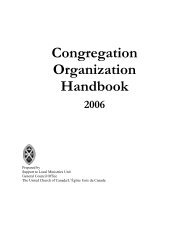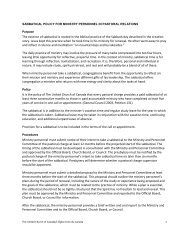letter to Stephen Harper - The United Church of Canada
letter to Stephen Harper - The United Church of Canada
letter to Stephen Harper - The United Church of Canada
Create successful ePaper yourself
Turn your PDF publications into a flip-book with our unique Google optimized e-Paper software.
Rt. Hon. <strong>Stephen</strong> <strong>Harper</strong><br />
Prime Minister <strong>of</strong> <strong>Canada</strong><br />
80 Welling<strong>to</strong>n Street<br />
Ottawa, Ontario<br />
K1A 0A2<br />
November 28, 2008<br />
Prime Minister,<br />
<strong>The</strong> undersigned environmental and international development organizations wish <strong>to</strong><br />
thank you for your recent announcement <strong>of</strong> funding for adaptation <strong>to</strong> climate change in<br />
developing countries, a step in the right direction that we hope will be followed by further<br />
commitments by <strong>Canada</strong> on ambitious action <strong>to</strong> fight climate change.<br />
We also write <strong>to</strong> express our belief that the best destination for <strong>Canada</strong>’s contribution is<br />
the Adaptation Fund <strong>of</strong> the Kyo<strong>to</strong> Pro<strong>to</strong>col. A contribution <strong>to</strong> the Adaptation Fund would<br />
send a strong signal <strong>of</strong> <strong>Canada</strong>’s commitment <strong>to</strong> effective climate adaptation, a key issue<br />
in the negotiations for a post-2012 global climate deal.<br />
<strong>The</strong> Fourteenth Conference <strong>of</strong> Parties <strong>to</strong> the <strong>United</strong> Nations Framework Convention on<br />
Climate Change (UNFCCC), which gets underway on December 1 in Poznan, Poland, is<br />
expected <strong>to</strong> fully operationalize the Adaptation Fund, building on successful negotiations<br />
in Nairobi in 2006 and Bali in 2007. This Fund is designed <strong>to</strong> reduce the vulnerability <strong>of</strong><br />
developing countries <strong>to</strong> climate change by financing adaptation projects aligned with<br />
countries’ needs and priorities, and designed <strong>to</strong> provide transparent decision-making and<br />
an equitable governance structure. <strong>The</strong> Adaptation Fund is designed <strong>to</strong> receive a share <strong>of</strong><br />
proceeds from the Clean Development Mechanism (CDM), but is capable <strong>of</strong> accepting<br />
contributions from other sources <strong>of</strong> funding as well.<br />
As the share <strong>of</strong> the proceeds from the CDM has not yet been monetized, contributions <strong>to</strong><br />
this Fund are crucial <strong>to</strong> allow it <strong>to</strong> expeditiously start supporting adaptation activities in<br />
the most vulnerable countries. Furthermore, contributions are necessary as the expected<br />
scale <strong>of</strong> resources from the CDM is nowhere near the level <strong>of</strong> funding needed.<br />
As you know, the world’s adaptation needs are massive: the UNFCCC Secretariat has<br />
estimated that the world will face adaptation needs amounting “<strong>to</strong> several tens <strong>of</strong> billion<br />
<strong>United</strong> States dollars” annually. <strong>The</strong> same study notes that additional contributions <strong>of</strong><br />
public dollars are needed, particularly for adaptation needs in developing and least<br />
developed countries. Unfortunately, it is the world’s poorest people ― those who have<br />
done the least <strong>to</strong> contribute <strong>to</strong> climate change — who feel the effects <strong>of</strong> global warming<br />
first and hardest. <strong>The</strong> Adaptation Fund can be a key mechanism <strong>to</strong> begin meeting these<br />
needs; <strong>of</strong> course, adaptation funding must be increased by a few orders <strong>of</strong> magnitude as<br />
part <strong>of</strong> the post-2012 climate deal.
Prime Minister, we believe that the Poznan meeting presents <strong>Canada</strong> with an ideal<br />
opportunity <strong>to</strong> show leadership in fighting global warming by contributing the $100<br />
million <strong>to</strong> the Adaptation Fund instead <strong>of</strong> the other multilateral alternatives, such as the<br />
World Bank’s Climate Investment Funds. Developing countries and civil society groups<br />
have expressed concerns about the governance arrangements and funding track record <strong>of</strong><br />
the World Bank. In contrast, developing countries have pushed hard <strong>to</strong> make the<br />
Adaptation Fund operational and <strong>to</strong> ensure that its governance is equitable.<br />
A Canadian contribution <strong>to</strong> the Adaptation Fund would help <strong>to</strong> build goodwill among the<br />
Parties at the negotiation table, a step <strong>to</strong>wards a successful outcome <strong>of</strong> the negotiations in<br />
Copenhagen in December 2009. This contribution would also help <strong>Canada</strong> <strong>to</strong> begin<br />
fulfilling its UNFCCC obligation <strong>to</strong> “assist the developing country Parties that are<br />
particularly vulnerable <strong>to</strong> the adverse effects <strong>of</strong> climate change in meeting costs <strong>of</strong><br />
adaptation <strong>to</strong> those adverse effects.” Finally, dedicating <strong>Canada</strong>’s contribution <strong>to</strong> the<br />
Adaptation Fund would help <strong>to</strong> address a crisis that you have rightly called “perhaps the<br />
biggest threat <strong>to</strong> confront the future <strong>of</strong> humanity <strong>to</strong>day.”<br />
Thank you for your consideration <strong>of</strong> this timely and important matter.<br />
Sincerely,<br />
Canadian Council for International Co-operation<br />
Canadian Foodgrains Bank<br />
Climate Action Network – Réseau Action Climat<br />
David Suzuki Foundation<br />
<strong>The</strong> Halifax Initiative Coalition<br />
KAIROS: Canadian Ecumenical Justice Initiatives<br />
One Sky<br />
Pembina Institute<br />
Sierra Club <strong>of</strong> <strong>Canada</strong><br />
<strong>The</strong> <strong>United</strong> <strong>Church</strong> Of <strong>Canada</strong><br />
CC:<br />
Hon. Jim Prentice, Minister <strong>of</strong> the Environment<br />
Hon. Beverley Oda, Minister <strong>of</strong> International Cooperation<br />
Hon. Stéphane Dion, Leader <strong>of</strong> the Official Opposition<br />
Gilles Duceppe, Leader <strong>of</strong> the Bloc Québécois<br />
Hon. Jack Lay<strong>to</strong>n, Leader <strong>of</strong> the NDP<br />
Michael Martin, Chief Negotia<strong>to</strong>r and Ambassador for Climate Change


